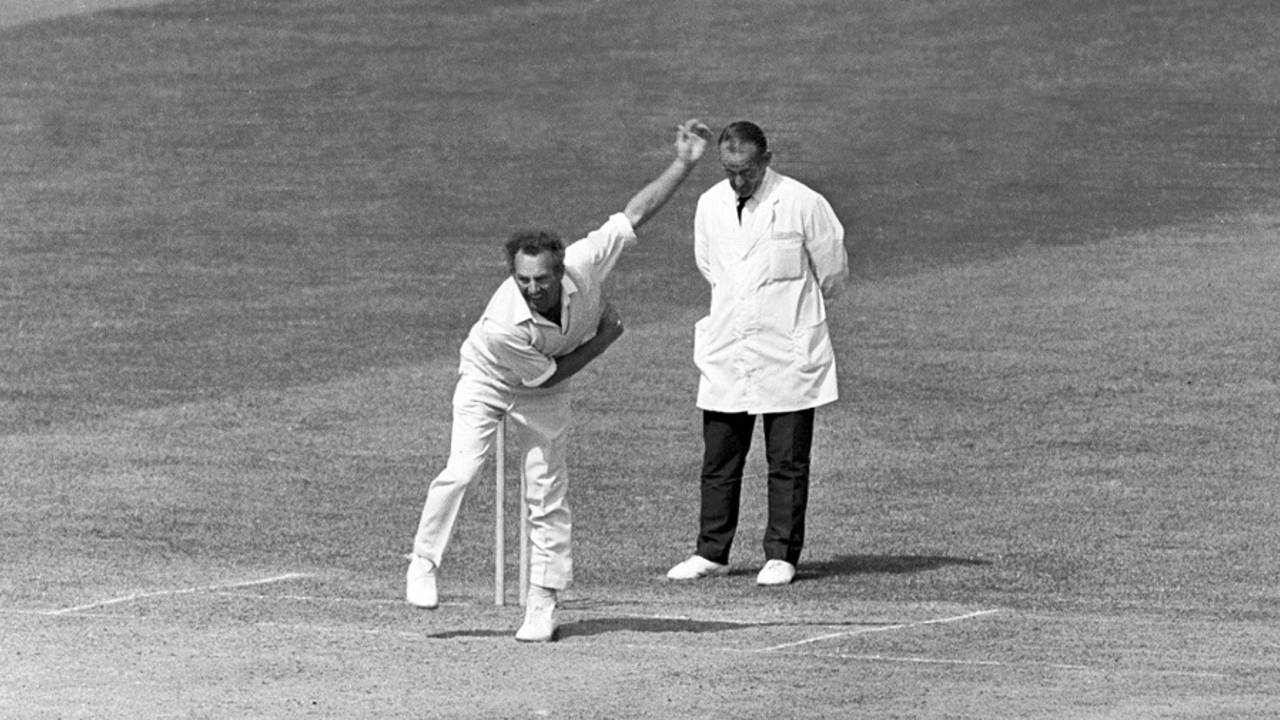Don Shepherd, the pride of Welsh cricket
Glamorgan bowler Don Shepherd, who took 2218 wickets in a first-class career spanning 22 years, has died at the age of 90
David Hopps
19-Aug-2017
Don Shepherd's tally of 2218 first-class wickets are the most by a player to have never represented England • PA Images Archive/Getty Images
Don Shepherd, a giant of Glamorgan cricket and widely regarded as one of the best county cricketers never to play for England, has died, aged 90.
Shepherd was one of the great servants of county cricket, a source of huge pride for all cricket-lovers in Wales, as he totted up 668 first-class matches between 1950 and 1972. Born in Port Eynon on the Gower Peninsula, he began life as a fast-medium bowler but in his vintage years was highly respected for his slow-medium offcutters.
He died only a week after celebrating his 90th birthday after complications set in following a heart operation.
John Arlott, the great broadcaster and cricket writer, termed it "inexplicable" that Shepherd never played for England, and, especially on responsive pitches, he would doubtless have made the grade. But he was never seriously considered and was up against some fine practitioners - the Surrey pair of Jim Laker and Tony Lock in the fifties, and by the likes of Raymond Illingworth and Fred Titmus later in his career.
At the end of it all, he had 2218 first-class wickets, all of them genially claimed, and the most ever taken by a player who failed to represent England. It left him 22nd on the all-time list. He was a shrewd analyst of a batsman, with deceptive changes of pace and flight and his contentment in his work made him a captain's dream.
The lack of England recognition did not overly bother him. In a BBC interview to mark his 90th birthday, Shepherd recalled: "It never worried me. There were so many terrific offspinners around towards the end - Fred Titmus, David Allen, John Mortimore, Ray Illingworth - and they could bat, while I was a bit of a slogger. I was happy enough doing what I did and what happened to me through my life."
Glamorgan endured many lean years during his career, but there was achievement, too, in the winning of the 1969 county championship, which they finished unbeaten. Shepherd took the final wicket, and, to add to the happy coincidence, had taken his 2,000th first-class wicket earlier in the game. He took five or more wickets in an innings on 123 occasions.
Victory against the 1964 Australians at Swansea, when he took 9 for 93 in the match, was quite a turn-up for the tourists who had only lost to one county side, Surrey, since 1912. To swell the outpouring of Welsh pride, the national Eisteddfod - a traditional Welsh festival of music, literature and performance arts - was being held a mile down the road and both teams accepted an invitation to attend one evening. Shepherd and Jim Pressdee, who between them had bowled out the Australians in the first innings on a rain-freshened pitch, were given a huge ovation.
Shepherd later recalled: "After going up on the stage, we were so full of hwyl that there was no way we were going to lose that match."
Glamorgan followed up with another defeat of the tourists in 1968, this time with Shepherd standing in as skipper for Tony Lewis. Some put the victory down to Shep's "guile and cunning", a tribute he would treat with characteristic modesty. No wonder Australia always regarded him highly.
He had few pretensions as a batsman, and called himself "a walking wicket", although his rustic hitting brought much pleasure, and Wisden said he was able to empty "bar and beer tent in five seconds flat". There was nothing better than his 51 in 11 scoring shots against Australia at Swansea in 1961.
Glamorgan had collapsed to 94 for 8, undone by the legspin of Richie Benaud and left-arm wristspinner Lindsay Kline, who both benefited from a dry and dusty surface, tailor-made for Shepherd. His 50 came in 15 minutes and off 21 balls, equalling the world record. Famously, Benaud termed it "the greatest bit of sustained hitting that I have ever seen in my life".
Shepherd would often reflect: "Most things used to happen at Swansea", and, as his home town, that made things all the more pleasurable.
As a fast-medium bowler, he took 155 wickets in 1952, winning his county cap, but he lost his form in the mid-1950s, and, after advice from senior players including wicketkeeper Haydn Davies, converted to bowling offcutters as a result. In the first season of this change - 1956 - he took 168 wickets, and he exceeded 100 wickets 12 times in all. Lean and crinkly-haired, canny and persevering, he became one of the county game's most reliable figures.
The nearest he got to an England call-up was a match for MCC against the West Indians at Lord's in 1957 and a tour of Ceylon and Far East with MCC in 1969-70. He was named one of Wisden's Cricketers of the Year in 1970, a tribute he marked by taking 106 first-class wickets that summer, more than any other player in first-class cricket.
He was a hugely popular figure on Glamorgan grounds after his retirement, a shrewd and respected bowling coach who acted as a mentor for many years for Robert Croft, a Glamorgan offspinner who did go on to play for England.
He was also a genial commentator on BBC Radio Wales, where his melodious and affable judgments were much prized, and where his double act with fellow commentator Eddie Bevan was the very essence of cricket in Wales. After the broadcast was over, he would generally lean against the bar and chat about the game some more, in generous and forgiving tones which made him a wonderful representative of the game he cherished.
David Hopps is a general editor at ESPNcricinfo @davidkhopps
